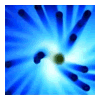 |
||||||||||
Updated: September 21, 2026
Veltuzumab
Fully Humanized Competition for Rituxan
Another Anti-CD20 Monoclonal in Clinical Trials
 Immunomedics is recruiting CLL and NHL patients for a Phase I/II clinical trial of their new anti-CD20 monoclonal at multiple centers across the U.S. Read about how this Mab compares to the gold standard Rituxan in Veltuzumab: Another Anti-CD20 Monoclonal in Clinical Trials.
Immunomedics is recruiting CLL and NHL patients for a Phase I/II clinical trial of their new anti-CD20 monoclonal at multiple centers across the U.S. Read about how this Mab compares to the gold standard Rituxan in Veltuzumab: Another Anti-CD20 Monoclonal in Clinical Trials.
Radioimmunotherapy
The Tricky Business of Using Radiation in CLL
Bexxar: An Introduction
 A Phase II clinical trial for CLL has been launched by the Fred Hutchinson Cancer Research Center in Seattle, using the radioimmunotherapy agent, Bexxar. By combining a CD20-targeting monoclonal antibody with a radioactive payload, this agent offers the promise of high-precision targeting plus a lethal wallop – which may lead to low MRD and long remissions. But since CLL invariably involves the bone marrow, the partcipants must first go through a course of RF therapy to get B-cell infiltration of the marrow as low as possible and thereby avoid damage to the bone marrow and precious stem cells. Read about how this first-line therapy may work for you in Bexxar: An Introduction to Radioimmunotherapy.
A Phase II clinical trial for CLL has been launched by the Fred Hutchinson Cancer Research Center in Seattle, using the radioimmunotherapy agent, Bexxar. By combining a CD20-targeting monoclonal antibody with a radioactive payload, this agent offers the promise of high-precision targeting plus a lethal wallop – which may lead to low MRD and long remissions. But since CLL invariably involves the bone marrow, the partcipants must first go through a course of RF therapy to get B-cell infiltration of the marrow as low as possible and thereby avoid damage to the bone marrow and precious stem cells. Read about how this first-line therapy may work for you in Bexxar: An Introduction to Radioimmunotherapy.
Antibody in Development
An Antibody Targeted to the CD23 Marker
Lumiliximab: The Next Drug in CLL?
 Biogen Idec, the folks that brought us Rituxan, are busy developing a new monoclonal antibody for use in CLL. The drug, Lumiliximab (formerly IDEC 152), has some interesting features that might make it useful in treating CLL. It targets CD23, a marker which is brightly expressed by CLL cells and is in fact a B-cell activation marker. The drug appears to have an enviably low toxicity profile. We review the research literature from early clinical trials, discuss the major features of the agent itself and evaluate a recently launched pivotal Phase III multicenter clinical trial of the drug as an addition to the FCR protocol. For the details, see our review titled Lumiliximab: The Next Drug in CLL?
Biogen Idec, the folks that brought us Rituxan, are busy developing a new monoclonal antibody for use in CLL. The drug, Lumiliximab (formerly IDEC 152), has some interesting features that might make it useful in treating CLL. It targets CD23, a marker which is brightly expressed by CLL cells and is in fact a B-cell activation marker. The drug appears to have an enviably low toxicity profile. We review the research literature from early clinical trials, discuss the major features of the agent itself and evaluate a recently launched pivotal Phase III multicenter clinical trial of the drug as an addition to the FCR protocol. For the details, see our review titled Lumiliximab: The Next Drug in CLL?
HuMax-CD20
A New Generation Antibody
More Effective in CLL?
 A small Danish company, Genmab, is developing a new monoclonal antibody, HuMax-CD20 for use in B-cell cancers. The new antibody is similar to Rituxan in that it targets the CD20 antigen expressed by mature B-cells and like Rituxan it appears to be well-tolerated with few side effects. Its similarity to Rituxan seems to stop there. The new Genmab antibody is fully human as opposed to Rituxan which is "chimeric" or mouse-based, it tags a different part of the CD20 epitope closer to the CLL-cell's surface, it adheres more strongly to the leukemic B-cell, and it is more effective in mobilizing complement attack — all of which might make it more effective than Rituxan in CLL. The antibody has been fast-tracked by the FDA for clinical trials as monotherapy in refractory CLL as well as in a chemoimmunotherapy combination involving the traditional agents fludarabine and cyclophosphamide. Our directory page on HuMax-CD20 has links to a number of articles on this new monoclonal antibody.
A small Danish company, Genmab, is developing a new monoclonal antibody, HuMax-CD20 for use in B-cell cancers. The new antibody is similar to Rituxan in that it targets the CD20 antigen expressed by mature B-cells and like Rituxan it appears to be well-tolerated with few side effects. Its similarity to Rituxan seems to stop there. The new Genmab antibody is fully human as opposed to Rituxan which is "chimeric" or mouse-based, it tags a different part of the CD20 epitope closer to the CLL-cell's surface, it adheres more strongly to the leukemic B-cell, and it is more effective in mobilizing complement attack — all of which might make it more effective than Rituxan in CLL. The antibody has been fast-tracked by the FDA for clinical trials as monotherapy in refractory CLL as well as in a chemoimmunotherapy combination involving the traditional agents fludarabine and cyclophosphamide. Our directory page on HuMax-CD20 has links to a number of articles on this new monoclonal antibody.
Sons of Rituxan and Campath
New and Improved Antibodies Target CD20 and CD52
A New Generation of More Effective Antibodies Makes It into the Clinic
 The monoclonal antibodies Rituxan and Campath have changed the landscape for CLL and a whole range of hematological conditions. New improved versions of these monoclonal antibodies are now coming out of the lab and into the clinic. In our article Sons of Rituxan and Campath, we examine the mechanisms by which these agents achieve their effects - and the methods for increasing their efficacy. Read about a new CD20 monoclonal antibody, HuMax-CD20 from GenMab, now in clinical trials in Europe and in the US and, incidentally, satisfy your curiosity about why we have a picture of a lobster gracing this paragraph.
The monoclonal antibodies Rituxan and Campath have changed the landscape for CLL and a whole range of hematological conditions. New improved versions of these monoclonal antibodies are now coming out of the lab and into the clinic. In our article Sons of Rituxan and Campath, we examine the mechanisms by which these agents achieve their effects - and the methods for increasing their efficacy. Read about a new CD20 monoclonal antibody, HuMax-CD20 from GenMab, now in clinical trials in Europe and in the US and, incidentally, satisfy your curiosity about why we have a picture of a lobster gracing this paragraph.
Campath Therapy
The CD52 Antibody
Strong Medicine
 Campath-1H is a 'humanized' monoclonal antibody that targets the CD52 antigen which is abundantly expressed on leukemic B-cells. Unfortunately, that antigen is also expressed by a variety of other cell lines, a fact which makes treatment with Campath fraught with immune suppression and other dangers. However, this agent is effective in a great many CLL cases as monotherapy, and even more so in combination with other agents. It is the only agent that has been shown to be effective in p53 deleted cases, the toughest of them all. In fact, Campath the only antibody which has been specifically approved (as of March 2026) by the FDA for treatment of CLL. This website has a number of articles on Campath therapy and its complications — the entire collection is listed on our directory page for Campath Therapy.
Campath-1H is a 'humanized' monoclonal antibody that targets the CD52 antigen which is abundantly expressed on leukemic B-cells. Unfortunately, that antigen is also expressed by a variety of other cell lines, a fact which makes treatment with Campath fraught with immune suppression and other dangers. However, this agent is effective in a great many CLL cases as monotherapy, and even more so in combination with other agents. It is the only agent that has been shown to be effective in p53 deleted cases, the toughest of them all. In fact, Campath the only antibody which has been specifically approved (as of March 2026) by the FDA for treatment of CLL. This website has a number of articles on Campath therapy and its complications — the entire collection is listed on our directory page for Campath Therapy.
Rituxan
Pioneering Anti-CD20 Antibody
Antibody Continues to Play a Key Role in Treating B-cell Cancers
 Ten years after first receiving approval from the FDA for treating Non-hodgkin's Lymphoma, Rituxan continues to play an important, almost ubiquitous role in the treatment of B-cell cancers. It has limitations as monotherapy in CLL but it synergizes well with chemotherapy agents. It is widely used, especially in the lymphomas — and a resounding commercial success. Its CD20 target antigen turns out to be very suitable as a therapy target because it is expressed in varying degrees by mature B-cells and by no other cell lines. While in CLL the target antigen is only dimly expressed, it nevertheless offers a targeting ability that makes therapies involving Rituxan quite focused on the disease. There is a great deal of material on this website on the antibody and our Rituxan directory page will provide links to much of it.
Ten years after first receiving approval from the FDA for treating Non-hodgkin's Lymphoma, Rituxan continues to play an important, almost ubiquitous role in the treatment of B-cell cancers. It has limitations as monotherapy in CLL but it synergizes well with chemotherapy agents. It is widely used, especially in the lymphomas — and a resounding commercial success. Its CD20 target antigen turns out to be very suitable as a therapy target because it is expressed in varying degrees by mature B-cells and by no other cell lines. While in CLL the target antigen is only dimly expressed, it nevertheless offers a targeting ability that makes therapies involving Rituxan quite focused on the disease. There is a great deal of material on this website on the antibody and our Rituxan directory page will provide links to much of it.
Antibodies in Development
Naming the Agents in Antibody Zoo
Promises and Tests
 We take a brief look at some of the monoclonal antibodies that are in development or testing for CLL. With many of these agents it will take years before they are routinely available to patients: but some of their sponsors will be recruiting participants in new experimental protocols that may offer hope to many. An informed patient should be better able to judge if a particular agent is of interest to him or her. To get a glimpse of the lay of the land, read our survey of Monoclonal Antibodies in Development
We take a brief look at some of the monoclonal antibodies that are in development or testing for CLL. With many of these agents it will take years before they are routinely available to patients: but some of their sponsors will be recruiting participants in new experimental protocols that may offer hope to many. An informed patient should be better able to judge if a particular agent is of interest to him or her. To get a glimpse of the lay of the land, read our survey of Monoclonal Antibodies in Development
IDEC 152
Early Results for New Monoclonal Antibody
Safety, Efficacy, Toxicity...
 CD23, a B-cell proliferation marker, is the molecular target for this new antibody being developed by Idec Pharmaceuticals, the folks that brought us Rituxan. The theory behind using this targeting mechanism is very interesting. The usefulness of this antibody in actual CLL therapy will of course have to be demonstrated in human clinical trials. In this article, IDEC 152, we review the early experimental results for this drug and provide our own editorial comments on ths agent.
CD23, a B-cell proliferation marker, is the molecular target for this new antibody being developed by Idec Pharmaceuticals, the folks that brought us Rituxan. The theory behind using this targeting mechanism is very interesting. The usefulness of this antibody in actual CLL therapy will of course have to be demonstrated in human clinical trials. In this article, IDEC 152, we review the early experimental results for this drug and provide our own editorial comments on ths agent.
Background on MABs
History and Science of Monoclonal Antibodies
Magic Bullets and Target Practice
 Monoclonal antibodies provide the critical ability to selectively attack cell populations in the body that exhibit certain molecular markers. By a judicious choice of a target marker and careful design of the antibody itself to deliver a death signal or to recruit immune system components to finish the job or even synergize with traditional chemotherapy agents, we can use these monoclonal antibodies to deliver very targeted therapy. While chemotherapy is still quite relevant because of its potency and capacity to deal with heavy tumor load, monoclonal antibodies have given us a critical ability to target cancers to get deeper responses with, we hope, less collateral damage. In our Introduction to Monoclonal Antibodies we review the science and history of these agents and provide a quick review of where these developments in immunotherapy are heading.
Monoclonal antibodies provide the critical ability to selectively attack cell populations in the body that exhibit certain molecular markers. By a judicious choice of a target marker and careful design of the antibody itself to deliver a death signal or to recruit immune system components to finish the job or even synergize with traditional chemotherapy agents, we can use these monoclonal antibodies to deliver very targeted therapy. While chemotherapy is still quite relevant because of its potency and capacity to deal with heavy tumor load, monoclonal antibodies have given us a critical ability to target cancers to get deeper responses with, we hope, less collateral damage. In our Introduction to Monoclonal Antibodies we review the science and history of these agents and provide a quick review of where these developments in immunotherapy are heading.
 Enter Keywords: |
———
Disclaimer: The content of this website is intended for information only and is NOT meant to be medical advice. Please be sure to consult and follow the advice of your doctors on all medical matters.
Copyright Notice:
Copyright © 2026-2007 CLL Topics, Inc. All Rights Reserved.
All materials contained on this site are protected by United States copyright law and may not be reproduced, distributed, transmitted, displayed, published or broadcast without the prior written permission of CLL Topics, Inc. You may not alter or remove any trademark, copyright or other notice from copies of the content.
However, you may download and print material from CLLTopics.org exclusively for your personal, noncommercial use.
———
